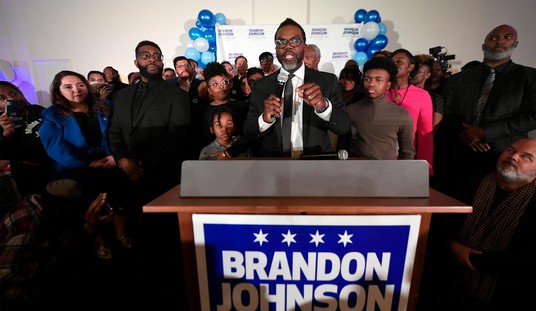It’s a good question, and last night’s disappointment in Georgia makes it even more acute. Before it became clear that the GA-06 special election would head to a runoff in two months, Democrat Jon Ossoff called the result “a victory for the ages.” Ahem:
OSSOFF here in Atlanta: "We may not know the outcome for some time… but there is no doubt this already a victory for the ages.”
— Robert Costa (@costareports) April 19, 2017
Other Democrats don’t see a victory for the ages, or even a moral victory. Instead, they wonder when they’ll see the first victory of the Trump era. As Politico’s Gabriel Benedetti points out, the prospects are growing dimmer rather than brighter after Ossoff failed to close the deal in Georgia. The party and its constituent activist groups may have to keep the angry energy up for a long, long time before they get to a win:
For all the anger, energy, and money swirling at the grassroots level, Democrats didn’t manage to pick off the first two Republican-held congressional seats they contended for in the Trump era, and the prospects aren’t markedly better in the next few House races coming up: the Montana race at the end of May, and the South Carolina contest on June 20.
Their best shot at knocking Donald Trump down a peg appears to be Ossoff’s runoff against Republican Karen Handel, also scheduled for June 20. But the Democrat will be an underdog in that contest, when there won’t be a crowded field of Republicans to splinter the vote.
After that, it’ll be another five months before the New Jersey and Virginia elections for governor, leaving some strategists and lawmakers wondering how to keep the furious rank-and-file voters engaged in fueling and funding the party’s comeback — especially given the sky-high expectations that surrounded Ossoff’s ultimately unsuccessful run at the 50-percent threshold that was necessary to win the seat outright.
In fact, compared to Hillary Clinton’s performance in the same district in November, this doesn’t even look like a moral victory, let alone one for the ages. Ossoff raised $8.3 million to campaign just in this district, giving him a huge advantage in a special election. His 48.1% of the vote was just a little over a point better than Hillary’s final result in GA-06 — 46.8%. That’s a pretty lousy return on investment, and the huge buildup of Ossoff’s chances by the national party may have damaged their credibility for the larger contest next year:
Now, with Ossoff falling short of an outright win despite an unprecedented surge of campaign cash and national attention — in a district which Hillary Clinton lost by just one point in 2016 — comes the potential for another round of finger-pointing within the party. The worry: that if operatives and voters continue their practice of quietly blaming each other for losses, as they did after a narrow defeat outside of Wichita last week, the current level of runaway enthusiasm and budding trust in the national party leadership could sputter out long before the 2018 midterms.
It’s not just credibility that might get damaged, either. Democrats spent $8.3 million to win one House seat that they would almost certainly not be able to hold in the 2018 regular election anyway, a win which would have absolutely no impact on the party’s standing in Congress in the rest of the session. That would have been a foolish waste of resources even if Ossoff had managed to pull off a surprise win yesterday, and now it looks almost like gross political negligence. Those resources now won’t be available to defend one of the ten high-risk Senate Democrat incumbents coming up for re-election in 2018, and the continual disappointments will likely depress fundraising later in the cycle when the DNC and those incumbents really need it.
If there has been “budding trust in national party leadership,” this episode in wasting time and resources on pointless fights shows it’s hardly warranted.
What lessons should Democrats take from these “moral victories” “for the ages”? For one thing, it’s not enough to despise and demonize an opponent; it might make for good fundraising in the short run, but it’s not going to change voters or districts even while spending tons of cash organizing around it. More critically, though, these races prove that hard-progressive groups are not going to gain enough traction to make Democrats competitive in center-right districts, especially when they’re endorsing a return to Washington-establishment norms. If Democrats want to gain traction in center-right Middle America, they have to demonstrate that the party honors and rewards a center-right perspective rather than demeaning and demonizing it. That will become even more obvious in a general election cycle where voter turnout will return to a more predictable and representative model, rather than be subject to the spikes in special-election organizing — which so far hasn’t been enough for Democrats anyway.








Join the conversation as a VIP Member